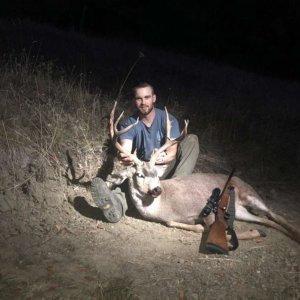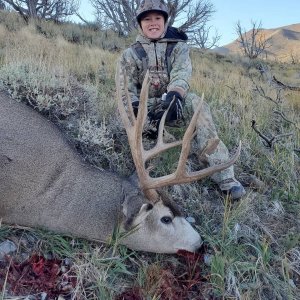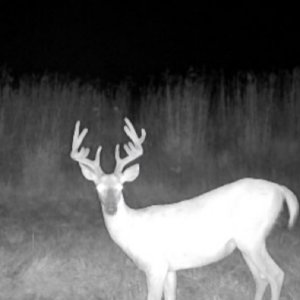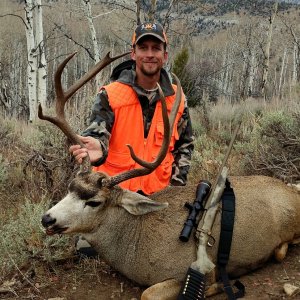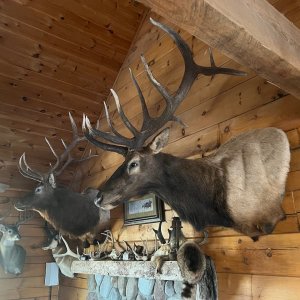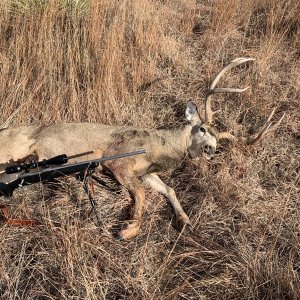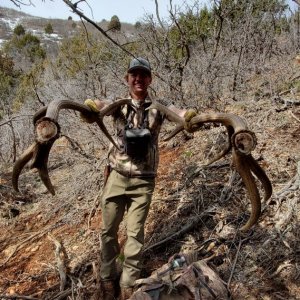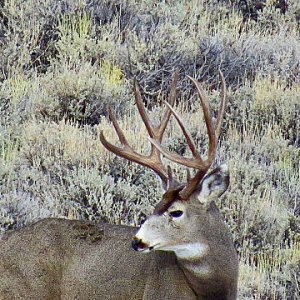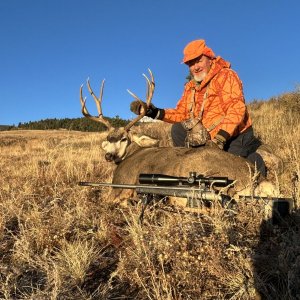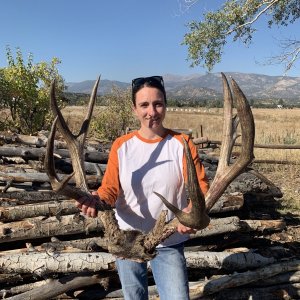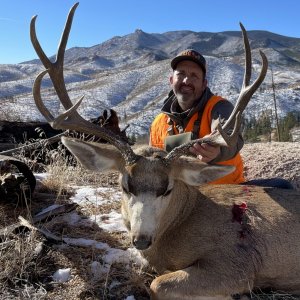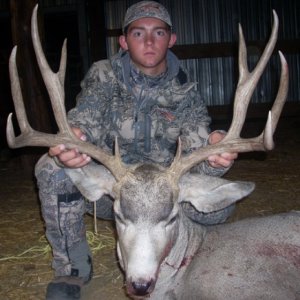B
boneaddict
Guest
Why are there always idiots mucking things up for the rest of us, and why are there idiots that always make stupid decisions to try to cope with the other idiots????????
Wintering Elk May Need More Closures
By SCOTT SANDSBERRY
YAKIMA HERALD-REPUBLIC
It's probably not going to happen for another year ? if at all ? but Yakima area game managers and wildlife biologists are considering limited closures in areas used for forage by wintering elk.
The plan, should it ultimately be instituted, would be designed to protect elk from overly aggressive "shed hunters" ? collectors of antlers dropped by the animals during January and February.
It wouldn't be designed to deny access to the horseback riders, motorcyclists, shooters or mountain bikers ? but that's just what it could do. And officials know those user groups aren't likely to welcome prospective closures, a sentiment that would almost certainly become obvious during the public-review process that would precede any such closures.
"Everybody will have their say and everybody will likely say 'We don't support it,' except maybe the hunters who want to be able to see those elk reside out in that area," said Lee Stream, regional wildlife director for the Washington Department of Fish and Wildlife.
Ironically, Stream said, the success of one program designed to bolster the health and population of Yakima elk herds has heightened interest in shed hunting. In 1994, the Yakima and
Colockum herds had dwindling numbers of mature bulls ? the kind with the sort of branch antlers coveted by collectors ? so general hunting rules prohibited hunting those bulls.
The strategy worked. Now there are more mature bulls ? and more shed hunters.
"Now we've got a lot more branched-antler bulls out there, and more bulls, period," Stream said. "We've created a new recreation sport, just de facto, by doing this."
And practitioners of that sport can go too far.
So says Rob Cavanaugh, an Olympia man who has long hunted in the Yakima area and closely monitors wildlife issues around the state. Two years ago, Cavanaugh said, friends of his saw a private airplane swooping low over a herd of wintering elk, prompting the elk to run. A man on an ATV ? presumably working in concert with the pilot ? was then coming by to pick up any antlers dropped by the elk.
Rance Block, a Spokane-area regional vice-president with the Rocky Mountain Elk Foundation, wasn't too surprised to hear that tale.
"You would hear horror stories you wouldn't believe from agencies around the country," Block said. "There have been situations near Jackson Hole (Wyoming) where people have run elk with snowmobiles into wire strands that (the snowmobilers) have crossed, with the idea that the elk will run into them and drop their antlers."
To prevent just that kind of activity, Oak Creek Wildlife Area manager John McGowan instituted winter closures in the areas nearest the Oak Creek elk-feeding stations. Now game managers are considering similar closures ? probably involving the areas surrounding elk-feeding sites at West Valley, Cowiche, Mellotte (Wenas) and Joe Watt and Robinson canyons.
It's also possible that an L.T. Murray/Wenas closure might entail everything from the Yakima River to the Ellensburg-Wenas crossover road.
And that would be fine with Cavanaugh, who has asked the state wildlife commission in writing to close several east-side wildlife areas ? including L.T. Murray/Wenas ? annually from Jan. 1 through May 1, just to protect the wintering elk.
"It would create a problem for me because I'm a turkey hunter, and it means I can't go up there if that particular spot is closed until the first of May," Cavenaugh said. "But I'm willing to do that if it's for the betterment of the elk."
If it happens, it won't be unique.
Yakima region wildlife biologist Jeff Bernatowicz checked to see what kind of state, federal and local closures were used to protect wintering elk in four other Western states with elk and deer populations ? Idaho, Montana, Oregon and Wyoming.
Each state had more wide-ranging closures than Washington has, Bernatowicz said.
"In most cases, if it's state land, the areas are closed outright (during winter)," he said. "My take on this is that the density of people in Wyoming and Montana is something along the lines of six per square mile; in Washington, we have 90 per square mile. They're saying we see a problem here, yet with our density in Washington, we're saying we don't see a problem yet.
"Somebody's obviously right and somebody's obviously wrong. Either they see a need that isn't there or we're way behind on things."
McGowan, who said he'd like to see closures with a consistent start and end date to minimize confusion for winter recreationists, said he knows many within the various user groups will be unhappy with any closures mandated by the WDFW.
He knows that from personal experience after winter closures began at Oak Creek. He says he took "a pretty good filleting" when he attended a meeting of snowmobilers over the issue.
But he wasn't about to back down from his belief that some winter recreation would simply have to take a back seat to the health of the elk herds.
"Nobody else is going to speak up for wildlife if we don't," he said.
"These animals have to stay out there, so every time (humans) move them, they're impacting them, because (the animals') critical energy reserves are low, especially late in the season.
"That's what people have to realize. They have to take their blinders off to their own little special-interest need."
Wintering Elk May Need More Closures
By SCOTT SANDSBERRY
YAKIMA HERALD-REPUBLIC
It's probably not going to happen for another year ? if at all ? but Yakima area game managers and wildlife biologists are considering limited closures in areas used for forage by wintering elk.
The plan, should it ultimately be instituted, would be designed to protect elk from overly aggressive "shed hunters" ? collectors of antlers dropped by the animals during January and February.
It wouldn't be designed to deny access to the horseback riders, motorcyclists, shooters or mountain bikers ? but that's just what it could do. And officials know those user groups aren't likely to welcome prospective closures, a sentiment that would almost certainly become obvious during the public-review process that would precede any such closures.
"Everybody will have their say and everybody will likely say 'We don't support it,' except maybe the hunters who want to be able to see those elk reside out in that area," said Lee Stream, regional wildlife director for the Washington Department of Fish and Wildlife.
Ironically, Stream said, the success of one program designed to bolster the health and population of Yakima elk herds has heightened interest in shed hunting. In 1994, the Yakima and
Colockum herds had dwindling numbers of mature bulls ? the kind with the sort of branch antlers coveted by collectors ? so general hunting rules prohibited hunting those bulls.
The strategy worked. Now there are more mature bulls ? and more shed hunters.
"Now we've got a lot more branched-antler bulls out there, and more bulls, period," Stream said. "We've created a new recreation sport, just de facto, by doing this."
And practitioners of that sport can go too far.
So says Rob Cavanaugh, an Olympia man who has long hunted in the Yakima area and closely monitors wildlife issues around the state. Two years ago, Cavanaugh said, friends of his saw a private airplane swooping low over a herd of wintering elk, prompting the elk to run. A man on an ATV ? presumably working in concert with the pilot ? was then coming by to pick up any antlers dropped by the elk.
Rance Block, a Spokane-area regional vice-president with the Rocky Mountain Elk Foundation, wasn't too surprised to hear that tale.
"You would hear horror stories you wouldn't believe from agencies around the country," Block said. "There have been situations near Jackson Hole (Wyoming) where people have run elk with snowmobiles into wire strands that (the snowmobilers) have crossed, with the idea that the elk will run into them and drop their antlers."
To prevent just that kind of activity, Oak Creek Wildlife Area manager John McGowan instituted winter closures in the areas nearest the Oak Creek elk-feeding stations. Now game managers are considering similar closures ? probably involving the areas surrounding elk-feeding sites at West Valley, Cowiche, Mellotte (Wenas) and Joe Watt and Robinson canyons.
It's also possible that an L.T. Murray/Wenas closure might entail everything from the Yakima River to the Ellensburg-Wenas crossover road.
And that would be fine with Cavanaugh, who has asked the state wildlife commission in writing to close several east-side wildlife areas ? including L.T. Murray/Wenas ? annually from Jan. 1 through May 1, just to protect the wintering elk.
"It would create a problem for me because I'm a turkey hunter, and it means I can't go up there if that particular spot is closed until the first of May," Cavenaugh said. "But I'm willing to do that if it's for the betterment of the elk."
If it happens, it won't be unique.
Yakima region wildlife biologist Jeff Bernatowicz checked to see what kind of state, federal and local closures were used to protect wintering elk in four other Western states with elk and deer populations ? Idaho, Montana, Oregon and Wyoming.
Each state had more wide-ranging closures than Washington has, Bernatowicz said.
"In most cases, if it's state land, the areas are closed outright (during winter)," he said. "My take on this is that the density of people in Wyoming and Montana is something along the lines of six per square mile; in Washington, we have 90 per square mile. They're saying we see a problem here, yet with our density in Washington, we're saying we don't see a problem yet.
"Somebody's obviously right and somebody's obviously wrong. Either they see a need that isn't there or we're way behind on things."
McGowan, who said he'd like to see closures with a consistent start and end date to minimize confusion for winter recreationists, said he knows many within the various user groups will be unhappy with any closures mandated by the WDFW.
He knows that from personal experience after winter closures began at Oak Creek. He says he took "a pretty good filleting" when he attended a meeting of snowmobilers over the issue.
But he wasn't about to back down from his belief that some winter recreation would simply have to take a back seat to the health of the elk herds.
"Nobody else is going to speak up for wildlife if we don't," he said.
"These animals have to stay out there, so every time (humans) move them, they're impacting them, because (the animals') critical energy reserves are low, especially late in the season.
"That's what people have to realize. They have to take their blinders off to their own little special-interest need."

